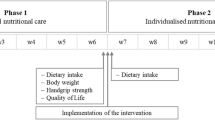Abstract
Objectives: To improve nursing home (NH) staff delivery of oral liquid nutritional supplements between meals to residents with a history of weight loss.Design: Pre-Post intervention study.Setting: Two skilled nursing homes.Participants: Eighteen long term care residents.Intervention: At baseline all participants had a non-specific physician’s order to receive a nutritional supplement. The intervention consisted of specifying the physician’s order as follows: “Give 4 oz high protein supplement at 10am, 2pm, and 7pm”.Measurements: Research staff conducted direct observations for two days during and between meals for a total of 4 days, or 12 possible observation periods per participant before and one week following the intervention. Research staff documented NH staff delivery of snacks (including high protein supplements) and amount consumed (fluid ounces) for the high protein supplements using a standardized protocol during each observation period.Results: Before the specific order was written participants were offered any type of snack an average of 1.82 times per day and a high protein supplement 0.59 times per day. After the specific order was written participants were offered any type of snack an average of 1.59 times per day and a high protein supplement 0.91 times per day. There were no statistically significant differences in the average number of times snacks or supplements were offered before and after the specific order was written. The proportion of snacks offered that were high protein supplements did increase after the specific order was written (p<0.001). When a high protein supplement was provided, most residents consumed 100% of it.Conclusions: Oral liquid nutritional supplements were not provided consistent with orders in NH practice. The specificity of the order related to type of supplement and time of delivery did not influence when and how often supplements are provided to residents but it did influence the type of nutritional supplement offered.
Similar content being viewed by others
References
Blaum CS, Fries BE, Fiatarone MA. Factors associated with low body mass index and weight loss in nursing home residents. J Gerontol A:Bio Sci Med Sci 1995;50A:M162-M168.
Silver AJ, Morley JE, Strome LS, Jones D, Vickers L. Nutritional status in an academic nursing home. J Am Geriatr Soc 1988;36:487–491.
Shaver HJ, Loper JA, Lutes RA. Nutritional status of nursing home patients. J Parenter Enteral Nutr 1980;4:367–370.
Abassi AA, Rudman D. Undernutrition in the nursing home: Prevalence, consequences, causes, and prevention. Nutr Rev 1994;52:113–122.
Covinsky KE, Martin GE, Beyth RJ, et al. The relationship between clinical assessments of nutritional status and adverse outcomes in older hospitalized medical patients. J Am Geriatr Soc 1999;47:532–538.
Fiaterone MA, O’Neill EF, Doyle N, et al. Exercise training and nutritional supplementation for physical frailty in very elderly people. New Eng J Med 1994;330:1769–1175.
Lauque S, Arnaud-Battandier F, Mansourian R, et al. Protein-energy oral supplementation in malnourished nursing home residents. Age and Ageing 2000;29:51–56.
Young KWH, Greenwood CE, van Reekum R, et al. Providing nutrition supplements to institutionalized seniors with probable Alzheimer’s Disease is least beneficial to those with low body weight status. J Am Geriatr Soc 2004;52:1305–1312.
Johnson L, Dooley PA, Gleick JB. Oral nutritional supplement use in elderly nursing home patients. J Am Geriatr Soc 1993;41:947–952.
Kayser-Jones J, Schell ES, Porter C, et al. A prospective study of the use of liquid oral dietary supplements in nursing homes. J Am Geriatr Soc 1998;46:1378–1386.
Simmons SF, Patel A. Nursing Home Staff Delivery of Oral Liquid Nutritional Supplements to Residents at Risk for Unintentional Weight Loss. J Am Geriatr Soc 2006;54:1372–76.
Thomas DR, Ashmen W, Morley JE, Evans WJ. Nutritional management in longterm care: Development of a clinical guideline. Council for Nutritional Strategies in Long-Term Care. J Gerontol A Biol Sci Med Sci 2000;55:M725–34.
Simmons SF, Schnelle JF. Individualized feeding assistance care for nursing home residents: Staffing requirements to implement two interventions. J Gerontol A:Bio Sci Med Sci 2004;59A:966–973.
Schnelle JF, Simmons SF, Cretin S. Minimum nurse aide staffing required to implement best practice care in nursing homes. Chapter in Report to Congress: Appropriateness of minimum nurse staffing ratios in nursing homes, Phase 2 final, Ch. 3:1–40. Washington, DC: US Department of Health and Human Services, Health Care Financing Administration, 2001.
Simmons SF, Oterweil D, Schnelle JF. Improving food intake in nursing home residents with feeding assistance: A staffing analysis. J Gerontol A:Bio Sci Med Sci 2001;56A:M790-M794.
Simmons SF, Babinou S, Garcia E, et al. Quality assessment in nursing homes by systematic direct observations: Feeding assistance. J Gerontol A:Bio Sci Med Sci 2002;57A:M665-M671.
Schnelle JF, Simmons SF, Harrington C, Cadogan MP, Garcia E & Bates-Jensen B. Relationship of nursing home staffing to quality of care. Health Serv Res 2004;39:225–250.
Schnelle JF, Cretin S, Saliba D & Simmons SF. Minimum nurse aide staffing required to implement best practice care in nursing homes. Chapter in Report to Congress: Appropriateness of Minimum Nurse Staffing Ratios in Nursing Homes. Health Care Financing Administration, Vol. 2: Ch. 14:14.1–14.68; Cambridge: Abt Associates, Inc, 2000.
Author information
Authors and Affiliations
Corresponding authors
Rights and permissions
About this article
Cite this article
Whiteman, E., Ward, K., Simmons, S.F. et al. Testing the effect of specific orders to provide oral liquid nutritional supplements to nursing home residents: A quality improvement project. J Nutr Health Aging 12, 622–625 (2008). https://doi.org/10.1007/BF03008272
Received:
Accepted:
Issue Date:
DOI: https://doi.org/10.1007/BF03008272



